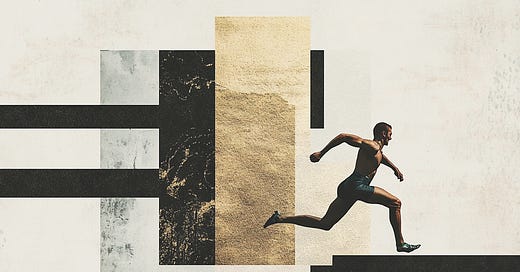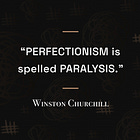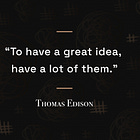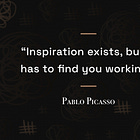Train Your Creativity Like an Olympic Athlete
How I use intentional training cycles to achieve peak creative performance
Welcome to Unknown Arts, where we explore the creative power of art and technology. Ready to forge ahead into the unknown? Join the journey!
In recent weeks, we've explored the pitfalls of perfectionism, the numbers game of creative success, and practical ways to boost output. But there's another crucial element to sustained creativity that's often overlooked: intentional training cycles.
What if, instead of grinding away more hours, we approached our creative work with the strategic mindset of an Olympic athlete? Let's dive into how this shift in perspective can transform your creative process.
Great athletes work smarter, not just harder
Top athletes understand that peak performance comes from a careful balance of focused work, strategic rest, and periodization. Applying these athletic principles to my creative work has been a game-changer.
In particular, I've learned that:
Consistency beats intensity. Regular, focused blocks of work yield better results than sporadic cram sessions.
Rest is productive. The moments of "doing nothing" are when my brain synthesizes ideas and prepares for the next breakthrough.
Periodization works. Alternating between periods of intense focus and relative ease allows for sustained growth over time.
Now, let’s get into how I structure my creative training plan with an athlete's mindset.
Structure your creative training like an athlete
Daily sessions build creative muscle
I aim for 2-4 hours of focused work daily. That's my "training session."
The most important thing is to show up for that session almost every day. It doesn't seem like a lot of time on any given day, but it's amazing how much I can accomplish in these concentrated bursts when I string together enough consecutive days.
To be clear, I do many things that look like work outside of those hours but they're supporting tasks. My core creative outputs almost always come from those precious few, focused hours.
Weekly rhythms balance intensity and recovery
My week is a mix of different "training days":
Base training days: These are my bread-and-butter work sessions, where I tackle my core creative and admin tasks.
High-intensity days: These are bursts focused on challenging projects or skill development. Since they're more mentally taxing, I try to schedule in recovery afterwards.
Active recovery: Some days are dedicated to lighter work like reading, researching, or gathering inspiration. They're kinda my creative "yoga days." A healthy, active support to my core training.
Rest days: I still struggle to take full days off, but that's only highlighted the need to schedule and commit to this time for full creative rest. It's not being lazy, it's making space for new ideas to appear.
Seasonal cycles drive long-term growth
Just as athletes don't maintain peak performance year-round, I cycle through different phases in my creative work:
Training blocks (~3-6 months): These are periods of focused skill development or project work. It's when I'm "in season," pushing my limits and producing at a high volume. For instance, when I started writing seriously, I committed to publishing for a couple of months to learn the basics. Then I took a break to reflect and decided to dive back in for the long haul.
Competition phases: These are times leading up to a major event. Maybe that's publishing a substantial article, launching a big redesign, or performing a show. These phases are geared toward achieving my peak performance for the moment in time. They reflect the results of my latest training and then give way to an "offseason" to recover.
Recovery and cross-training: These are periods to step back, reflect, and explore new areas. I've been in this zone since stepping away from my startup in August. One new thing I've been doing is exploring men's fashion and working on developing my personal style. It's been inspiring to go outside my comfort zone and explore a new creative domain.
This cyclical approach allows for sustained growth over time, much like how Olympic athletes structure their years leading up to the Games. They know the importance of thinking long term, building a strong foundation, and balancing recovery and reflection. It's all part of the plan to peak at the right times!
Your creative work is your personal Olympics
As we navigate the new creative economy, let's shed the outdated notion of "clocking in" 40+ hours a week just because it's the status quo.
Instead, let's train like athletes—balancing exertion and recovery, always with an eye towards long-term growth and sustainable performance.
Your creative work isn't a sprint or even a marathon. It's your personal Olympics—a lifelong journey of growth, discovery, and moments of peak performance. By adopting this athletic mindset and embracing intentional training cycles, you're setting yourself up for more breakthrough moments and lasting success.
So, lace up your creative sneakers and start training. Your best work is yet to come.
Until next time,
Patrick
PS. I'd love to hear how you structure your creative work. Do you have any techniques that help you balance productivity and rest? Reply to the email or share your thoughts in the comments!
If you got a little value from this post, consider subscribing or sharing. Follow me on X, Threads, or LinkedIn for more.







